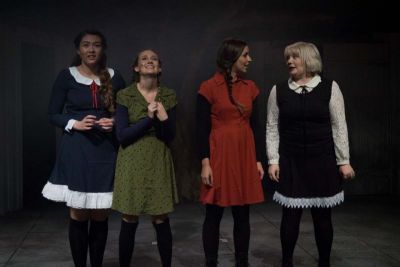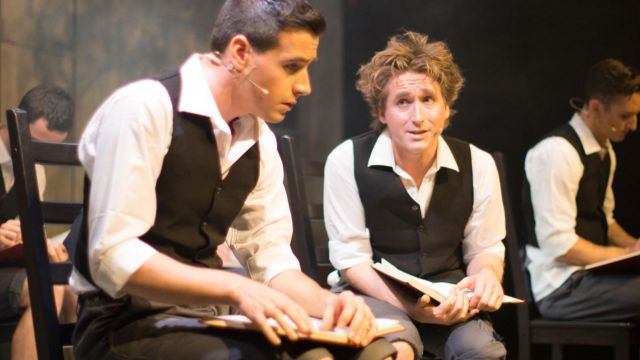Spring Awakening
Confronting, multi award winning rock musical Spring Awakening, based on a once-banned 1891 play, pulls no punches on themes including teenage sexuality, be it straight, gay or masturbation, youth suicide, teen pregnancy, abortion and child abuse, while raising a lot of questions about adult authority figures and parenting.
The combination of 1890s dialogue and contemporary rock / pop music embeds a universality of teenage rites of passage across more than a century, with a highlight of this production was the way in which Linda Brancato’s costuming embodied that.
 This new Sydney production brings together a talented up-and-coming cast, many of whom are graduates and current students of various music theatre courses. They’re an engaging young group of performers, led by Lloyd Harvey, an appealingly intense, sensitive Melchoir, and Susanna Downes, a vulnerable, naïve Wendla. Their shared scenes are particularly touching and credible. Alex Giles is engaging and believable as the rough-at-the edges, not-so-bright Moritz. Courtney Hough is a delightfully grounded Ilse, with ‘Blue Wind’ and her portion of ‘Purple Summer’ among the evening’s frequent vocal highlights. Supporting performances are consistent, committed and focused.
This new Sydney production brings together a talented up-and-coming cast, many of whom are graduates and current students of various music theatre courses. They’re an engaging young group of performers, led by Lloyd Harvey, an appealingly intense, sensitive Melchoir, and Susanna Downes, a vulnerable, naïve Wendla. Their shared scenes are particularly touching and credible. Alex Giles is engaging and believable as the rough-at-the edges, not-so-bright Moritz. Courtney Hough is a delightfully grounded Ilse, with ‘Blue Wind’ and her portion of ‘Purple Summer’ among the evening’s frequent vocal highlights. Supporting performances are consistent, committed and focused.
This is a highly accessible production, though it’s easily the least angry and aggressive of the four versions of the show I’ve seen, in a show where there’s usually so much teen angst.
 On opening night, Michael Watkins’ striking rustic set was both a hero and a villain. Visually it’s striking – two wooden buildings resonant of the 1890s period of the play, dominated by a gorgeous tree. However, upstage doors which open to reveal inset scenes, mostly involving the adult authority figures, were distracting, noisy and broke the atmosphere of songs and intimate moments at times, amplified by the fact that they were placed upstage centre. Poor placement of the cramped loft where Melchoir and Wendla make love at the end of act 1, and its associated of roofing beams, meant that this key moment was totally hidden from many in the audience.
On opening night, Michael Watkins’ striking rustic set was both a hero and a villain. Visually it’s striking – two wooden buildings resonant of the 1890s period of the play, dominated by a gorgeous tree. However, upstage doors which open to reveal inset scenes, mostly involving the adult authority figures, were distracting, noisy and broke the atmosphere of songs and intimate moments at times, amplified by the fact that they were placed upstage centre. Poor placement of the cramped loft where Melchoir and Wendla make love at the end of act 1, and its associated of roofing beams, meant that this key moment was totally hidden from many in the audience.
This is a pity, because generally Watkins’ setting facilitated the fluidity of Zana Cohen’s direction in a very challenging venue.
 A convention where purely prop hand-held microphones were used frequently worked badly against one of the most sensitive and affecting scenes in the show, the moment of gay awakening between two young men in Act 2, when the whole moment was lost in outbursts of laughter for all the wrong reasons as these props were raised.
A convention where purely prop hand-held microphones were used frequently worked badly against one of the most sensitive and affecting scenes in the show, the moment of gay awakening between two young men in Act 2, when the whole moment was lost in outbursts of laughter for all the wrong reasons as these props were raised.
Hopefully jarring elements like these can be sorted, so both the production and this splendid young cast are seen to far greater advantage.
Despite any reservations, it's a great joy to see the work of so many rising music theatre talents. I was in the midst of a large, mostly young audience who loved and related to both the show, and this production, which can only improve as the season progresses.
Neil Litchfield
Subscribe to our E-Newsletter, buy our latest print edition or find a Performing Arts book at Book Nook.

